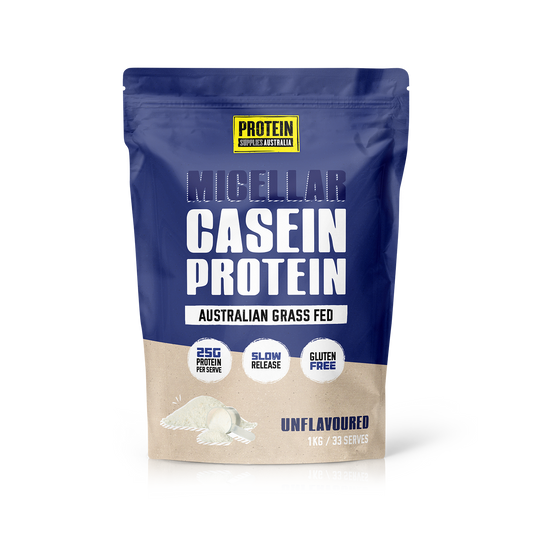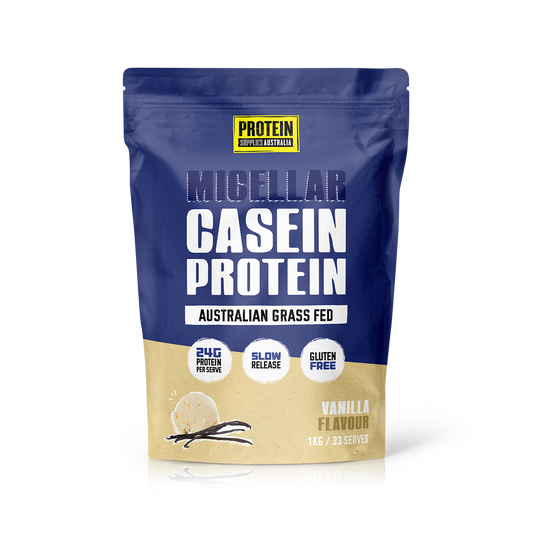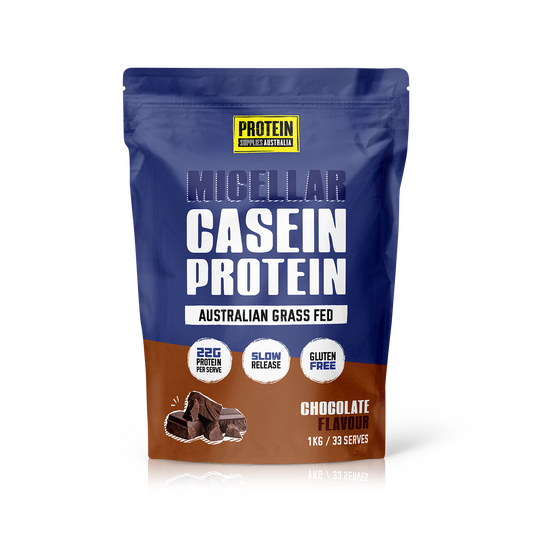-
Casein Pure
Vendor:Protein Supplies AustraliaRegular price $41.03Regular priceUnit price per -
Slow & Grow Casein Vanilla
Vendor:Protein Supplies AustraliaRegular price $41.03Regular priceUnit price per -
Slow & Grow Casein Chocolate
Vendor:Protein Supplies AustraliaRegular price $41.03Regular priceUnit price per
FAQ Casein Protein
What is casein protein?
Casein protein is a slow-digesting dairy protein derived from milk, making up about 80% of the protein content in cow's milk. It is known for its gradual release of amino acids.
Why is casein protein considered slow-digesting?
Casein protein forms a gel-like substance in the stomach, which slows down digestion and provides a sustained release of amino acids over several hours.
What are the main types of casein protein?
The main types are micellar casein and casein hydrolysate. Micellar casein is the natural form, while casein hydrolysate is pre-digested for faster absorption.
What is the difference between micellar casein and casein hydrolysate?
Micellar casein is slowly digested, providing a prolonged release of nutrients. Casein hydrolysate is broken down into smaller peptides, allowing for quicker digestion and absorption.
What are the primary benefits of taking casein protein?
Casein protein supports muscle growth, aids in recovery, helps prevent muscle breakdown, and promotes satiety due to its slow digestion rate.
How does casein protein help with muscle recovery?
By providing a steady release of amino acids, casein protein supports muscle repair and growth throughout the night or during long periods without food.
Can casein protein assist in weight management?
Yes, casein protein can help with weight management by promoting fullness and reducing overall calorie intake due to its slow-digesting nature.
When is the optimal time to consume casein protein?
Casein is best taken before bed to support muscle recovery overnight or between meals to maintain a steady supply of amino acids.
How much casein protein should I consume daily?
Typically, a serving size is 20-40 grams. The exact amount depends on your protein requirements, which vary based on factors such as age, weight, activity level, and fitness goals.
Is casein protein suitable for everyone?
Casein is generally safe for most individuals. However, those with milk allergies or severe lactose intolerance should avoid it or choose lactose-free versions.
Are there any side effects of consuming casein protein?
Some people may experience digestive discomfort such as bloating or gas. Starting with a smaller dose can help assess your tolerance.
How does casein protein compare to whey protein?
Casein protein digests more slowly, providing a prolonged release of amino acids, making it ideal for nighttime use. Whey protein digests quickly, making it better suited for post-workout recovery.
Is casein protein more beneficial than plant-based proteins?
Casein protein offers a complete amino acid profile and is particularly high in glutamine, which supports muscle repair. Plant-based proteins are suitable for those with dietary restrictions or preferences.
Is casein protein suitable for vegetarians?
Yes, casein protein is suitable for vegetarians who consume dairy products, as it is derived from milk.
Can people with lactose intolerance consume casein protein?
Casein protein contains some lactose, so individuals with lactose intolerance should choose lactose-free options or test their tolerance with small amounts.
What should I look for when choosing a casein protein supplement?
Look for high-quality, minimally processed casein protein with minimal additives. Ensure it is sourced from reputable manufacturers and undergoes third-party testing for purity and potency.
Can casein protein serve as a meal replacement?
While casein protein can be part of a meal replacement, it should be combined with other nutrient-dense foods like fruits, vegetables, and healthy fats to ensure a balanced intake.
Why choose casein protein over other protein supplements?
Casein protein is ideal for those seeking a slow-digesting protein to support muscle recovery overnight or to maintain satiety between meals. Its sustained release of amino acids makes it a unique and beneficial supplement for muscle maintenance and overall health.



